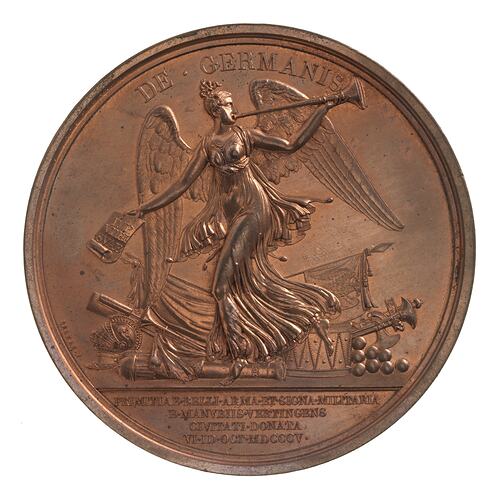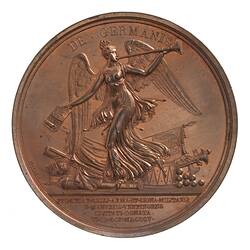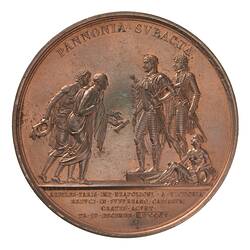Summary
Medal Deputation des Maires de Paris a Schoenbrunn, 'Pannonia Defeated', Issued by France, 1805
Artist: Nicholas Guy Antoine Brenet and Andre Galle
Minted by Paris Mint
Obverse Description
Laureate full figure of Napoleon in armour standing on a platform facing left, in his right hand, an olive branch, his left grasps his sheathed sword; behind him, one of his generals, probably Murat, he holds in his right hand his baton, and is also in armour; below, a female figure reclines, resting her left arm on a mortar inscribed, SCHOENBRUNN; to the left of the platform, the constituted bodies of Paris approach, one presents a scroll, around above, PANNONIA . SVBACTA.; in exergue, AEDILES . PARIS . IMP . NEAPOLIONI . A VICTORIA / REDVCI . IN SVBVRBANO . CAESARVM / GRATES . AGVNT . / PR . ID . DECEMBR . MDCCCV.; at left of esergue line, GALLE. F.
Reverse Description
Winged Victory advancing to left but looking back while sounding her trumpet, in her right hand, a scroll in her right on which, IMP / VRBI / SVAE; on the ground about, emblems of war - standards, artillery, drums, casques, cannon balls; around above, DE . GERMANIS; in exergue, PRIMITIAE . BELLI . ARMA . ET . SIGNA . MILITARIA / E . MANVBIIS . VERTINGENS / CIVITATI . DONATA / VI . ID . OCT. MDCCCV. ; in small lerrering nea rim above the left of the exergue line, BRENET. F
Edge Description
Plain
Significance
"This classical medal commemorates the conquest of Germany, (Pannonia Subacta, Pannonia, or Modern Germany, conquered). It was anciently a large country of Europe, bounded on the east by Upper Moesia, south by Dalmatia, west by Noricicum, and on the north by the Danube. The ancients divided it into Lower and Upper Pannonia. The inhabitants were of Celtic origin, and were first invaded by Julius Caesar, and conquered in the reign of Tiberius. Philip, and his son Alexander, some ages after, had successively conquered it. Sirmium was the ancient capital of all Pannonia, which contains the modern Provinces of Croatia, Carniola, Sclavonia, Bosnia, Windisch, March, with part of Servia, and of the kingdoms of Hungary and Austria.
Napoleon, while at Vienna, occupied the palace of Schoenbrunn. On his return to Paris, he was met in the suburbs of the city by the chief magistrate and the constituted bodies of Paris, who offered to him the thanks of the city, and conducted him in the style of the Romans in triumph to the capital. He appropriated a share of the Germanic spoils, as arms, military standards, &c, as represented on the reverse of the medal, to the good city of Paris." Laskey p. 108 (written in 1818)
More Information
-
Collection Names
-
Collecting Areas
-
Acquisition Information
Transfer from National Gallery of Victoria (NGV), 15 Mar 1976
-
Date Issued
1805 AD
-
Issued By
-
Artist
-
Artist
-
Mint
-
Series
-
Material
Bronze
-
Axis
12
-
Classification
-
Category
-
Discipline
-
Type of item
-
Dimensions
67 mm (Outside Diameter)
> 100 g.
-
Shape
Round
-
References
Laskey LXII
[Book] Laskey, J. C. Medals Struck at the National Medal Mint by Order of Napoleon Bonaparte., 107-108 Pages
-
Keywords


